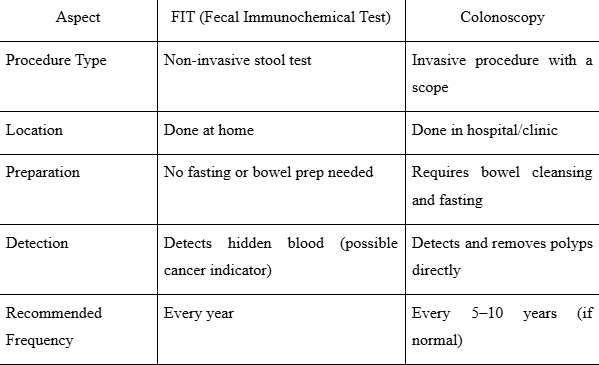By: Geraldus Sigap
Why Early Detection of Colorectal Cancer Matters
Colorectal cancer (CRC), or cancer of the colon and rectum, is one of the most common and preventable cancers worldwide. The good news is that when detected early, it can be treated effectively with a high survival rate. However, many people avoid screening because they assume it involves uncomfortable or invasive procedures. That’s where the Fecal Immunochemical Test (FIT) comes in, a simple, painless, and non-invasive stool test that can detect early signs of colorectal cancer long before symptoms appear.
What Is the Fecal Immunochemical Test (FIT)?
The Fecal Immunochemical Test (FIT) is a screening tool that detects hidden (occult) blood in the stool, which can be an early indicator of colorectal cancer or precancerous polyps.
Unlike traditional stool tests, FIT uses antibodies that specifically detect human hemoglobin, making it more accurate and easier to perform.
FIT is:
- Simple: Can be done at home using a provided test kit.
- Non-invasive: No need for bowel preparation, fasting, or hospital procedures.
- Accurate: More specific in detecting bleeding from the lower digestive tract (colon and rectum).
Who Should Take the FIT Test?
The FIT test is recommended for adults aged 45 years and older, even if they have no symptoms. Those with a family history of colorectal cancer or polyps should begin screening earlier, as advised by a doctor.
You should also consider getting a FIT test if you experience:
- Unexplained changes in bowel habits (diarrhea or constipation)
- Blood in the stool or dark/tarry stool
- Abdominal pain or bloating that doesn’t go away
- Unexplained weight loss or fatigue
Early screening helps identify problems before they progress into advanced cancer — when treatment is simpler and outcomes are much better.
How the FIT Test Works
The FIT test is very easy to perform:
- Collect a small sample of stool using the kit provided by your doctor or clinic.
- Send the sample to a laboratory for analysis.
The lab checks for traces of human hemoglobin, which may indicate bleeding from the colon.
If the test result is positive, it doesn’t always mean cancer, but further evaluation such as colonoscopy will be recommended to find the exact cause of the bleeding. If the result is negative, your doctor may recommend repeating the test every year as part of your routine health screening.
FIT vs. Colonoscopy: What’s the Difference?

FIT is ideal for annual screening, while colonoscopy is recommended if FIT results are positive or for those at higher risk.
Benefits of the FIT Test
- Quick and painless, no discomfort during the process
- Highly specific to bleeding from the colon or rectum
- Can be done in the comfort of your home
- Early detection means better treatment outcomes
- Cost-effective and easily repeatable annually
FIT is now one of the most widely recommended first-line screening tools for colorectal cancer worldwide, including by the World Health Organization (WHO) and major gastroenterology associations.
What to Do if Your FIT Result is Positive
If your FIT test result is positive, don’t panic. This does not necessarily mean you have cancer. A positive result simply means that blood was detected in your stool, and your doctor will likely recommend a follow-up colonoscopy to determine the source.
Common causes of a positive FIT result include:
- Hemorrhoids or anal fissures
- Polyps (precancerous growths)
- Inflammatory bowel disease (IBD)
- Colorectal cancer (in rare cases)
The key is early action, the sooner you follow up, the better your chances of preventing or treating any potential problem effectively.
RS Abdi Waluyo provides specialized care through its Gastroenterology Department, offering a comprehensive approach for digestive health and colorectal cancer prevention. Available services include: Gastroenterology consultation, Fecal Immunochemical Test (FIT), Colonoscopy, and advanced endoscopic procedures for diagnosis and treatment. Contact RS Abdi Waluyo at 021-3144989 or make an online appointment via https://abdiwaluyo.com/.
FAQ
- How often should I do a FIT test?
It is recommended to take the FIT test once a year as part of regular colorectal cancer screening, starting from age 45.
- Is the FIT test painful or uncomfortable?
Not at all. The test only requires a small stool sample that can be collected at home, no needles, anesthesia, or invasive procedures involved.
- Do I need to change my diet or medication before the test?
No, unlike older stool tests, FIT does not require dietary restrictions before collecting the sample.
- What if I have hemorrhoids, can it affect the result?
Yes, hemorrhoids can sometimes cause a false positive due to bleeding. Your doctor will interpret the result and may suggest further evaluation if needed.
- Is the FIT test available at RS Abdi Waluyo?
Yes. RS Abdi Waluyo offers FIT testing as part of its comprehensive colorectal cancer screening program, with follow-up evaluation and consultation by experienced gastroenterologists.
Referensi:
- Amitay, E. L., Gies, A., Weigl, K., & Brenner, H. (2019). Fecal Immunochemical Tests for Colorectal Cancer Screening: Is Fecal Sampling from Multiple Sites Necessary?. Cancers, 11(3), 400.
- D’Souza, N., Brzezicki, A., & Abulafi, M. (2019). Faecal immunochemical testing in general practice. The British journal of general practice : the journal of the Royal College of General Practitioners, 69(679), 60–61. https://doi.org/10.3399/bjgp19X700853
